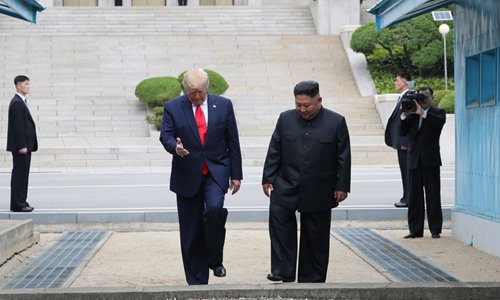HOME >> OPINION
Groundwork pertinent for fourth Trump-Kim meet
Source:Global Times Published: 2019/9/17 23:57:53

US President Donald Trump meets with Kim Jong Un, top leader of the Democratic People's Republic of Korea (DPRK), in the inter-Korean border village of Panmunjom on June 30, 2019. (Xinhua/NEWSIS)
North Korean leader Kim Jong-un invited US President Donald Trump to visit Pyongyang in a letter sent in August, South Korea's Joongang Ilbo newspaper reported on Monday, citing diplomatic sources. North Korea said on September 9 it was willing to restart denuclearization talks with the US in late September, while Trump hinted reporters on Thursday that he could meet Kim by the end of 2019.
It is somewhat too early to talk about another Kim-Trump meeting, as the two countries are still discussing working-level talks -- still, a distant dream -- before a meeting is finalized between the two heads of states. The talks are likely to focus on denuclearization issue, involving details of possible compensation measures by Washington after Pyongyang inks a final deal. The officials of the two countries will basically negotiate about their preconditions.
Kim and Trump have met three times before and their fourth meeting is possibly on the cards provided the working-level talks, which are the key, are successfully carried out.
An ideal outcome of the talks would be both sides conceding to some extent and Pyongyang making practical moves to denuclearize, and Washington lifting some of its sanctions. Besides, the US should also adopt new approaches to guarantee North Korea's regime and security.
If North Korea-US working-level talks go ahead as anticipated in late September, this would certainly pave the way for another Kim-Trump summit. One reason their summit in Hanoi, Vietnam in February collapsed was the two leaders rushed to the table even before working-level talks laid a proper stage. In addition, Trump added new conditions during the meeting, which Kim might have deemed as insulting and provocative.
Taking lessons from these bad experiences in Hanoi, before another Kim-Trump summit, I believe the two countries will probably do the comprehensive groundwork to ensure that working-level talks end with progress.
Kim and Trump agreed to restart working-level talks during their meeting at the Demilitarized Zone (DMZ) between the two Koreas, but the talks are yet to happen. However, after their handshakes at DMZ in late June, Pyongyang had test-fired several short-range ballistic missiles.
The first reason behind the missile tests could be North Korea's attempt at improving its military technology, which is part of the country's national defense. Pyongyang would get a stronger sentiment that it must not lag behind too far in the military, particularly when Washington and Seoul have held joint military exercises and Seoul has purchased F-35 fighter jets from Washington. In the meantime, North Korea is also wary of giving any threat perception to the US, so Pyongyang tested short-range rather than long-range missiles.
Another possible reason of North Korea's missile tests is that it might be a pressure tactic targeted at the US to take negotiations back to the table and concede on specific aspects of the Korean Peninsula denuclearization issue. If the US doesn't respond to the call for working-level talks, North Korea could pressurize it in other ways, such as launching long-range missiles.
Trump fired his national security adviser John Bolton on September 10 who held a strong stance toward North Korea, while Trump himself is not that tough in comparison with Bolton. Trump has maintained an open attitude when it came to negotiations with North Korea on the nuclear issue. Therefore, after hawkish Bolton left the White House, Trump is more likely to push forward his relatively moderate policy against Pyongyang. This could be good news for the talks between North Korea and the US as well as for the negotiation process in the future.
I hope the working-level talks between the two countries will be smoothly carried out. But if the two sides cling on to their former stances and refuse to concede, no progress is likely to be made, thus making the chances of another Kim-Trump summit very slim.
The article was compiled by Global Times reporter Xu Hailin based on an interview with Cui Zhiying, director of the Korean Peninsula Research Center at Tongji University. opinion@globaltimes.com.cn
Posted in: